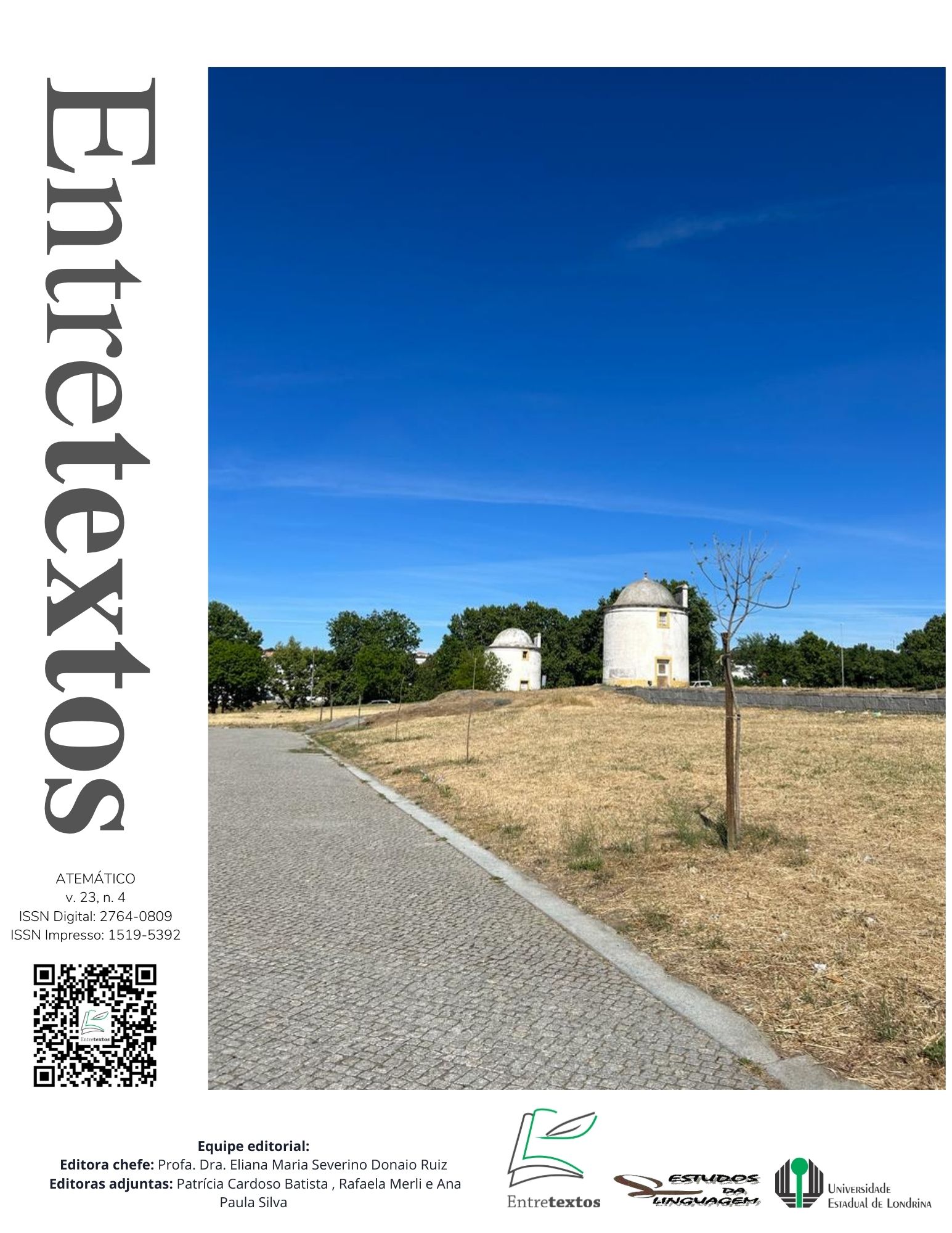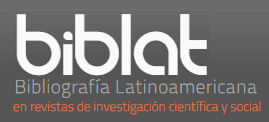Uma análise dos marcadores dêiticos na construção de sentidos da crônica A vaguidão específica
DOI:
https://doi.org/10.5433/1519-5392.2023v23n4p23-44Keywords:
deixis; fictitious transposition; preconstructedAbstract
This article proposes to analyze the use of deictic markers in the chronicle A vaguidão específica, by Millôr Fernandes, in order to understand how these linguistic mechanisms work and how they contribute to the construction of different meanings present in the text. In order to verify how deixis contributes to the effect of humor constructed in this fictional narrative, Levinson's (2006) contributions on deixis and Fonseca's ([1989] 1992, 1994) on deixis and fictional transposition are used. The notion of preconstructed from the perspective of enunciative semantics (CULIOLI, 1990; CAMPOS, XAVIER, 1991; CORREIA, PEREIRA, 2015a) proved to be another important conceptual tool for this discussion. Through a qualitative methodology, deictic markers and expressions that potentially refer to preconstructed ones are highlighted in order to investigate their functioning and discuss the possible meanings they convey. The results indicate that the humor effect comes from the blocking of access imposed on the reader/listener to the referential coordinates shared by the characters in the chronicle, co-enunciators who use the linguistic mechanisms under analysis to make themselves understood.
Downloads
References
ANSCOMBRE, J. C. La comédie de la polyphonie et ses personnages. Langue Française, Malakoff, n. 164, p. 11-31, 2009. DOI: https://doi.org/10.3917/lf.164.0011
BÜHLER, K. The deictic field of language and deictic words. In: JARVELLA, R. J.; KLEIN, W. (ed.). Speech, place and action. New York: Wiley, [1934] 1982. p. 9-30.
CAMPOS, M. H. C.; XAVIER, M. F. Sintaxe e semântica do português. Lisboa: Universidade Aberta, 1991.
CORREIA, C. N. Os tempos gramaticais em português europeu: as formas verbais e os valores de tempo, aspecto e modo(s). Verba Hispanica, Eslovênia, v. 20, n. 1, p. 245-257, 2012. DOI: https://doi.org/10.4312/vh.20.1 DOI: https://doi.org/10.4312/vh.20.1.245-259
CORREIA, C. N.; PEREIRA, S. P. Formas e construções linguísticas no português europeu: ferramentas referenciais e género textual. Cadernos de Linguagem e Sociedade, Brasília, v. 16, n. 1, p. 48-60, 2015a. DOI: https://doi.org/10.26512/les.v16i1.7531 DOI: https://doi.org/10.26512/les.v16i1.7531
CORREIA, C. N.; PEREIRA, S. P. Sobre a construção do espaço e do tempo: as formas cá e lá em português europeu. In: MADEIRA, A.; FIÉIS, A.; LOBO, M. (ed.). O universal e o particular: uma vida a comparar. Lisboa: Edições Colibri, 2015b. p. 103-115.
CULIOLI, A. Cognition and representation in linguistic theory. Amsterdam: John Benjamins Publishing Company, 1995. DOI: https://doi.org/10.1075/cilt.112
CULIOLI, A. Pour une linguistique de l'énonciation. T.l: Opérations et représentations. Paris: Ophrys, 1990.
DUCROT, O. Analyse de textes et linguistique de l’énonciation. In: DUCROT, O. et al. Les mots du discours. Paris: Minuit, 1980. p. 7-56.
FERNANDES, M. A vaguidão específica. In: FERNANDES, M. Trinta anos de mim mesmo. São Paulo: Círculo do Livro, [1974]. p. 77.
FONSECA, F. I. Deixis, dependência contextual e transposição fictiva: contributos para uma teoria enunciativa da ficção. In: FONSECA, F. I. Gramática e pragmática: estudos de linguística geral e de linguística aplicada ao ensino do português. Porto: Porto Editora, 1994. p. 87-103.
FONSECA, F. I. Deixis, tempo e narração. Porto: Fundação Eng. António de Almeida, [1989] 1992.
FONSECA, F. I. Referência, “translação de referência” e excesso referencial: uma leitura do “excesso” em dois textos de Oscar Lopes. Línguas e Literaturas, Porto, v. 4, p. 137-149, 1987. Disponível em: https://ler.letras.up.pt/uploads/ficheiros/2554.pdf. Acesso em: 17 maio 2023.
FREGE, G. The thought: a logical enquiry. In: STRAWSON, P. F. (ed.). Philosophical logic. Oxford: Oxford University Press, 1967. p. 17-38.
JUNGBLUTH, K.; VALLENTIN, R. Brazilian portuguese. In: JUNGBLUTH, K.; DA MILANO, F. (org.). Manual of deixis in romance languages. Berlim: De Gruyter, 2015. v. 6, p. 315-331. DOI: https://doi.org/10.1515/9783110317732-017
LEVINSON, S. Deixis. In: HORN, L.; WARD, G. (ed.). The handbook of pragmatics. Malden: Wiley Blackwell, 2006. p. 97-121. DOI: https://doi.org/10.1002/9780470756959.ch5
RUSSELL, B. On denoting. Oxford: Oxford University Press, 1905. DOI: https://doi.org/10.1093/mind/XIV.4.479
SEARLE, J. The logical status of fictional discourse. New Literary History, Baltimore, v. 6, n. 2, p. 319-332, 1979. DOI: https://doi.org/10.2307/468422 DOI: https://doi.org/10.2307/468422
WITTGEINSTEIN, L. Philosophische Untersuchungen. Berlim: Suhrkamp Verlag, 1953.
WITTGEINSTEIN, L. Tractatus logico-philosophicus. Tradução de Luiz Henrique Lopes dos Santos. São Paulo: Edusp, 1921.
Downloads
Published
How to Cite
Issue
Section
License
Copyright (c) 2023 Bruna Bandeira de Mello Santos, Clara Nunes Correia

This work is licensed under a Creative Commons Attribution 4.0 International License.
Entretextos adota a Licença Creative Commons Attribution 4.0 International, portanto, os direitos autorais relativos aos artigos publicados são do/s autor/es.
Sob essa licença é possível: Compartilhar - copiar e redistribuir o material em qualquer suporte ou formato. Adaptar - remixar, transformar, e criar a partir do material, atribuindo o devido crédito e prover um link para a licença e indicar se mudanças foram feitas.























